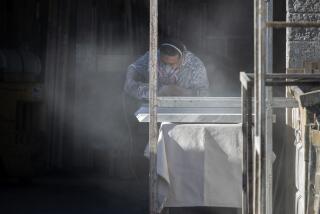Mortuary Oversight Lax, 2 Agents Say : Cemeteries: Inspectors tell Assembly panel that supervisors routinely ignored reports. Investigators report irregularities in files.
- Share via
SACRAMENTO — Two state inspectors, describing the regulation of California funeral homes as a “joke,” testified Thursday that their critical inspection reports on mortuaries were routinely ignored by supervisors who took no action.
Donald Hudgens, an inspector with the Board of Funeral Directors and Embalmers, said state regulation of the industry has been so lax that funeral homes often repeatedly violate rules because they know that no disciplinary action will be filed against them.
He told the Assembly Committee on Consumer Protection that at one funeral home, for example, he found the same violation of sanitary conditions on three successive inspections and, “I believe if I were to go back today I would find the same situation.”
On another occasion, when he complained to a supervisor that a mortuary official had stopped an inspection by threatening “to kill me,” Hudgens said he was simply told, “Well, you better not go back to that place.”
Another inspector, William Eckard, said he reported evidence in 1989 that a funeral home had been taking kickbacks from a florist, and by May, 1991, no action had been taken.
Two investigators for the Assembly Office of Research said their examination of funeral board files not only confirmed the inspectors’ testimony but also indicated puzzling irregularities in the records. While their initial examination of some files showed that no action had been taken on complaints, an examination three weeks later found that letters had been added to the files, which made it seem that action had been taken.
Errol Chisom and John Berthelsen said the letters appear to have been backdated and inserted into the files recently because they were “quite new and fresh in comparison to other documents in the file.”
James Allen, executive director of the funeral board, later denied emphatically that he had ever ordered letters to be backdated and added to files.
The two state inspectors and the two legislative investigators joined a parade of irate witnesses Thursday in six hours of testimony about bureaucratic bungling in the regulation of the state’s funeral homes, crematories and cemeteries.
Afterward, Assemblywoman Jackie Speier (D-South San Francisco), the committee’s chairwoman, called on the members of the funeral board and the state Cemetery Board to conduct a complete shake-up of their agency. In the meantime, she said, she would request an audit of the funeral board.
At several points, Speier interrupted the testimony to express outrage at what she was hearing. Once, she turned to Allen to say, “I want to tell you from a personal perspective, I think what has happened on your board is scandalous and unacceptable.”
Allen acknowledged that many cases before the funeral board had “fallen through the cracks,” but he said it was because it is facing a severe financial crisis and has had to lay off inspectors.
John Gill, executive director of the cemetery board, declined to discuss specific cases and maintained that his board has toughened its enforcement recently by adopting regulations that allow it to levy fines against substandard cemeteries.
His assurances, however, failed to mollify a series of witnesses. Consumers told of presenting evidence to state regulators that consumers had been defrauded, ashes commingled, human remains deposited in a vacant lot and corpses buried in water-filled graves. In each instance, they testified that little or no action was taken by the regulators.
“It is my experience if you want anything done you might as well skip the cemetery board,” said Duane C. Miller, a Sacramento lawyer. “It is not only a waste of time but there is also evidence that they tip off (violators).”
Leslie Pfardresher, a Sacramento teacher, told of a poor elderly couple she knew who had purchased two crypts in a local cemetery in 1974.
But when the husband died this year, cemetery officials told Pfardresher, who was acting on the widow’s behalf, that records showed only one crypt had been purchased--for the woman. Pfardresher said the destitute woman had to let her husband be buried by the county, which ordered him cremated as an indigent.
The widow died two months later. Pfardresher said that when she went to the cemetery this time, a different official advised her that the couple had, indeed, purchased two crypts.
When she complained to the cemetery board, Pfardresher said, an “extremely casual” state official answered the telephone and immediately began referring to the cemetery official by his first name. “I sensed they were on inappropriately friendly terms,” she said.
Although the official promised to look into the matter, she said she never heard from him again.
More to Read
Sign up for Essential California
The most important California stories and recommendations in your inbox every morning.
You may occasionally receive promotional content from the Los Angeles Times.










